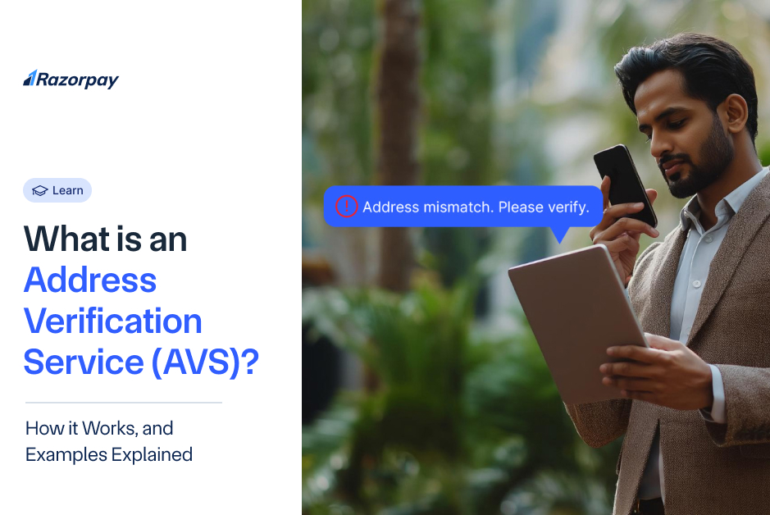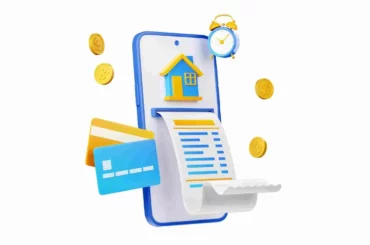Address Verification Service (AVS) is a security feature used by credit card networks and issuing banks to help you detect and prevent online payment fraud. It works by comparing the billing address entered by your customer with the address their bank has on record. This process is often triggered during an online transaction.
Once the comparison is done, the system returns a code—called an AVS response code—which tells you if the address details match or not. You receive this code in real-time and use it to decide whether to go ahead with the transaction or not. AVS is often used along with CVV checks, IP analysis, and biometric tools to reduce chargebacks and secure your payment process.
Table of Contents
What is Address Verification Service (AVS)?
AVS is a fraud prevention tool designed to reduce chargebacks in card-not-present transactions, such as online or phone payments. It helps you verify if the person making the payment is using the correct billing address linked to the card.
When a customer enters their billing address during checkout, the AVS system checks this information against the address stored by the card issuer. If there’s a mismatch—like a wrong street number or postal code—it flags the transaction. You then receive an AVS response code, which helps you decide whether to accept or reject the payment.
AVS helps you catch suspicious activity early, but it isn’t foolproof. Minor mismatches, like abbreviations or typos, can lead to false declines, especially for genuine customers. That’s why AVS is best used with other verification tools to build a balanced fraud detection strategy.
How Does Address Verification Service (AVS) Work?
When your customer enters their billing address at checkout and submits the payment, the AVS process begins. Your online payment gateway sends this address information to the relevant card network—such as Visa, MasterCard, or RuPay.
The card network then forwards the data to the issuing bank. The bank compares the submitted address with the one it has on file for that cardholder. Based on this check, the bank sends back an authorisation status along with an AVS response code to your payment gateway.
These AVS codes play a crucial role in your decision-making process. You use these codes to decide whether to approve or reject the transaction. For example, a full match may allow the payment to proceed, while a no match could trigger a rejection or manual review.
AVS codes help you filter out high-risk transactions, but AVS alone isn’t enough to stop all fraud. That’s why it’s part of a multi-layered security system. You can combine AVS with CVV number checks, IP tracking, device fingerprinting, and behavioural analytics to create a stronger fraud detection framework.
Example of Address Verification Service
Imagine a customer is shopping online at Amazon.com and proceeds to checkout. They enter their credit card details along with the billing address. Amazon’s payment gateway collects this billing address and sends it, along with the card details, to the customer’s card network—such as Visa or MasterCard. The card network then forwards this information to the issuing bank.
The bank compares the entered billing address with the one it has on file for that card. It then sends two pieces of information back to Amazon’s payment gateway: the authorisation status and an AVS response code. If the addresses match, the bank typically approves the transaction. If they don’t, the AVS response code will reflect the mismatch. Based on this, Amazon may decline the payment or flag it for review.
This entire AVS verification process happens within seconds and is invisible to the customer. It plays a critical role in helping merchants reduce fraud and avoid chargebacks without adding friction to the customer experience.
Conclusion
Address verification plays a crucial role in reducing online payment fraud for both banks and merchants. By validating billing addresses in real-time, AVS helps you prevent unauthorised transactions and reduce chargebacks.
To strengthen credit card security further, encourage your customers to use strong passwords and avoid sharing their card details. It’s also wise to regularly monitor card activity and review credit reports to catch any suspicious transactions early. Combining AVS with good security habits creates a safer payment experience for everyone involved.
Frequently Asked Questions (FAQs)
1. What information does Address Verification Service verify?
AVS checks the numeric portion of the billing address your customer enters—specifically, the street number and postcode—and compares these details with the address on file at the issuing bank.
2. Why is Address Verification Service important for businesses?
By matching address details at checkout, AVS helps you intercept unauthorised transactions before they complete. This reduces your exposure to online payment fraud and cuts down on chargebacks, strengthening your overall payment security.
3. What are the benefits of using an Address Verification Service?
AVS verification gives you immediate insight into transaction legitimacy, helping you decline high‑risk payments. You’ll see fewer chargebacks, better authorisation rates and a smoother experience for genuine customers.
4. How accurate is Address Verification Service?
AVS is accurate for domestic transactions but can produce false declines due to typos, formatting issues, or international cards. It’s best used with other fraud checks for reliable results.
5. What are the common errors encountered with Address Verification Service?
Common errors include address mismatches due to typos, outdated billing details, postcode changes, or inconsistent formatting. Also, sometimes cards issued outside India may not return complete or reliable AVS data.
6. Is Address Verification Service necessary for online transactions?
While AVS is not mandatory, you should treat it as a core component of your fraud prevention arsenal. It works alongside CVV checks, IP tracking and behavioural analytics within your online payment gateway to guard against unauthorised payments.
7. What industries commonly use Address Verification Services?
Industries that handle high volumes of card-not-present transactions—like e-commerce, financial services, online marketplaces, and payment processors—commonly use address verification systems.
8. How can businesses implement Address Verification Services into their systems?
You can enable AVS through your online payment gateway or merchant account settings. Most gateways offer built-in AVS features, allowing you to configure AVS checks and set rules based on response codes. For custom setups, AVS can also be integrated via API.



